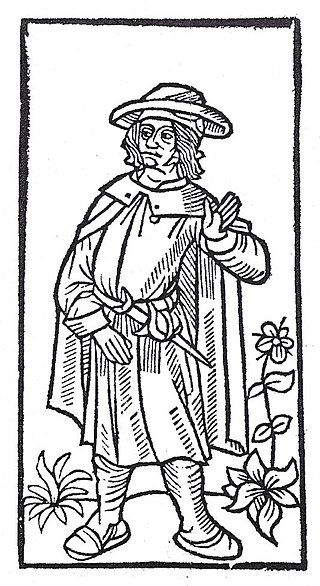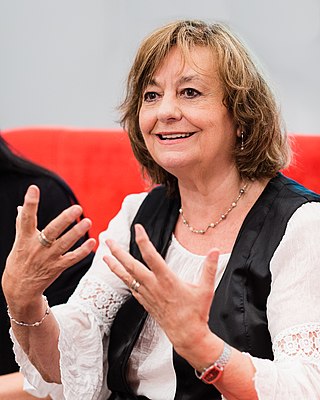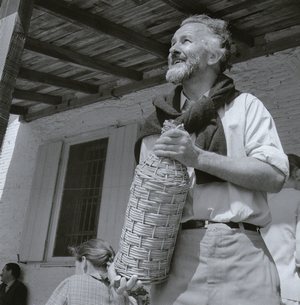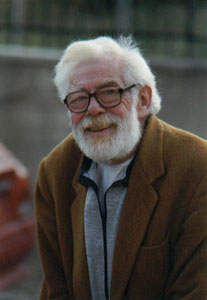Related Research Articles

An epigram is a brief, interesting, memorable, sometimes surprising or satirical statement. The word derives from the Greek ἐπίγραμμα. This literary device has been practiced for over two millennia.

François Villon is the best known French poet of the Late Middle Ages. He was involved in criminal behavior and had multiple encounters with law enforcement authorities. Villon wrote about some of these experiences in his poems.

Basil Cheesman Bunting was a British modernist poet whose reputation was established with the publication of Briggflatts in 1966, generally regarded as one of the major achievements of the modernist tradition in English. He had a lifelong interest in music that led him to emphasise the sonic qualities of poetry, particularly the importance of reading poetry aloud: he was an accomplished reader of his own work.

Donald Rodney Justice was an American teacher of writing and poet who won the Pulitzer Prize for Poetry in 1980.
Michael Peter Leopold Hamburger was a noted German-British translator, poet, critic, memoirist and academic. He was known in particular for his translations of Friedrich Hölderlin, Paul Celan, Gottfried Benn and W. G. Sebald from German, and his work in literary criticism. The publisher Paul Hamlyn (1926–2001) was his younger brother.

Ana Blandiana is a Romanian poet, essayist, and political figure. She took her name after Blandiana, near Vințu de Jos, Alba County, her mother's home village.

Peter Chad Tigar Levi was an English poet, archaeologist, Jesuit priest, travel writer, biographer, academic and prolific reviewer and critic. He was Professor of Poetry at the University of Oxford (1984–1989).
Meleager of Gadara was a poet and collector of epigrams. He wrote some satirical prose, now lost, and some sensual poetry, of which 134 epigrams survive.

Peter Neville Frederick Porter OAM was a British-based Australian poet.

Sándor Weöres was a Hungarian poet and author.
Katia Kapovich is a Russian poet now living in the United States. She writes in both Russian and English.
L'Imitation de Notre-Dame la Lune (1886) is a collection of poems by the French poet Jules Laforgue. It is dedicated to Gustave Kahn and "to the memory of little Salammbô, priestess of Tanit". It contains the following twenty-two poems:
Edmund Leroy "Mike" Keeley was an American novelist, translator, and essayist, a poet, and Charles Barnwell Straut Professor of English at Princeton University. He was a noted expert on the Greek poets C. P. Cavafy, George Seferis, Odysseus Elytis, and Yannis Ritsos, and on post-Second World War Greek history.
Greg Delanty is an Irish poet. An issue of the British magazine, Agenda, was dedicated to him.
Robin Fulton is a Scottish poet and translator, born on 6 May 1937 on the Isle of Arran. Since 2011 he has published under the name Robin Fulton Macpherson.

Philip Owen Arnould Sherrard was a British author and translator. His work includes translations of Modern Greek poets, and books on Modern Greek literature and culture, metaphysics, theology, art and aesthetics. In England he was influential in making major Greek poets of the nineteenth and twentieth centuries known. Sherrard was a practising Eastern Orthodox Christian and was responsible, along with Kallistos Ware and G. E. H. Palmer, for the first full translation of the Philokalia into English. He also wrote prolifically on theological and philosophical themes, describing what he believed to be a social and spiritual crisis occurring in the developed world, specifically modern attitudes towards the biophysical environment from a Christian and perennialist perspective.

Irwin Peter Russell was a British poet, translator and critic. He spent the first half of his life—apart from war service—based in Kent and London, being the proprietor of a series of bookshops, editing the influential literary magazine Nine and being part of the literary scene. Bankruptcy and divorce led to several years of travel which took him to Berlin, Venice, British Columbia and Iran, amongst other places. After the Iranian Revolution he settled permanently in Italy, where he spent the rest of his life. He lived in considerable financial hardship and throughout all he lived a life dedicated to poetry. His work never became mainstream, but it is highly regarded in some circles.
Peter Dent is an English editor, poet, and former school teacher whose poetry has moved from spare notations to linguistic experiments.

John Birtwhistle is an English poet published by Carcanet Press. His libretto for David Blake’s opera The Plumber’s Gift (1989) was staged by English National Opera at the London Coliseum and broadcast on BBC Radio 3.
Dick Davis is an English–American Persophile and Iranologist, poet, university professor, a vocal dissident critic of the Islamic Republic of Iran, and award-winning translator of Persian verse, who is affiliated with the literary movement known as New Formalism in American poetry.
References
- ↑ Stringer, Jenny; John Sutherland (1996). The Oxford Companion to Twentieth-century Literature in English. Oxford University Press. p. 154. ISBN 0-19-212271-1.
- ↑ His memories of this association were published in the festschrift Another Round at the Pillars, ed. David Harsent, Cargo Press, Cornwall, 1999; it is available online
- ↑ Peter Dale in conversation with Cynthia Haven. Waywiser-press.com. Retrieved on 26 August 2011.
- ↑ "Ian Hamilton in Conversation with Peter Dale", Agenda 31.2, 1993, pp. 7–21
- ↑ Ian Hamilton website
- ↑ International Who's Who of Authors and Writers'. Retrieved on 26 August 2011.
- 1 2 Peter Dale. Lidiavianu.scriptmania.com. Retrieved on 26 August 2011.
- ↑ This was produced for sale at The Visceral Image group exhibition held in the Woodstock Gallery, London, between 20 July – 15 August 1959. The others participating were Eddie Wolfram (paintings), M.J.Foley (drawings) and Isaac Witkin (sculptures). Dale's poems were handwritten on hardboard and displayed on the walls and there was a tape-recording of him reading these.
- ↑ In a personal letter dated 1985 discovered in a second hand copy Dale described it as "an abortion of a book I rushed through when [Macmillan] were axing their list"